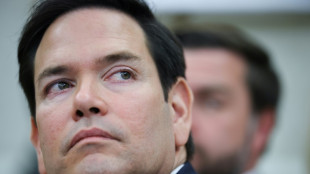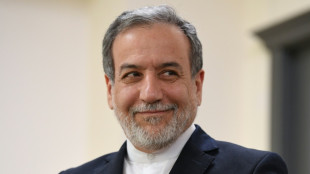
-
 Stocks rise on bank earnings, auto tariff hopes
Stocks rise on bank earnings, auto tariff hopes
-
Trump showdown with courts in spotlight at migrant hearing

-
 Ecuador electoral council rejects claims of fraud in presidential vote
Ecuador electoral council rejects claims of fraud in presidential vote
-
Russia jails four journalists who covered Navalny

-
 Trump says China 'reneged' on Boeing deal as tensions flare
Trump says China 'reneged' on Boeing deal as tensions flare
-
Trump eyes near 50 percent cut in State Dept budget: US media

-
 Trump says would 'love' to send US citizens to El Salvador jail
Trump says would 'love' to send US citizens to El Salvador jail
-
'Unprecedented' Europe raids net 200 arrests, drugs haul

-
 Everyone thinks Real Madrid comeback 'nailed-on': Bellingham
Everyone thinks Real Madrid comeback 'nailed-on': Bellingham
-
NATO's Rutte says US-led Ukraine peace talks 'not easy'

-
 Harvey Weinstein New York retrial for sex crimes begins
Harvey Weinstein New York retrial for sex crimes begins
-
More than 10% of Afghans could lose healthcare by year-end: WHO

-
 Stocks rise as auto shares surge on tariff break hopes
Stocks rise as auto shares surge on tariff break hopes
-
Facebook chief Zuckerberg testifying again in US antitrust trial

-
 Pakistan court refuses to hear Baloch activist case: lawyers
Pakistan court refuses to hear Baloch activist case: lawyers
-
Inzaghi pushing Inter to end San Siro hoodoo with Bayern and reach Champions League semis

-
 Arsenal's Odegaard can prove point on Real Madrid return
Arsenal's Odegaard can prove point on Real Madrid return
-
China's Xi begins Malaysia visit in shadow of Trump tariffs

-
 Andrew Tate accusers suing for 'six-figure' sum, UK court hears
Andrew Tate accusers suing for 'six-figure' sum, UK court hears
-
Macron to honour craftspeople who rebuilt Notre Dame

-
 Van der Poel E3 'spitter' facing fine
Van der Poel E3 'spitter' facing fine
-
Khamenei says Iran-US talks going well but may lead nowhere

-
 Nearly 60,000 Afghans return from Pakistan in two weeks: IOM
Nearly 60,000 Afghans return from Pakistan in two weeks: IOM
-
Auto shares surge on tariff reprieve hopes

-
 Sudan war drains life from once-thriving island in capital's heart
Sudan war drains life from once-thriving island in capital's heart
-
Trump trade war casts pall in China's southern export heartland

-
 Ukraine's Sumy prepares to bury victims of 'bloody Sunday'
Ukraine's Sumy prepares to bury victims of 'bloody Sunday'
-
Iraq sandstorm closes airports, puts 3,700 people in hospital

-
 French prisons targeted with arson, gunfire: ministry
French prisons targeted with arson, gunfire: ministry
-
Pandemic treaty talks inch towards deal

-
 Employee dead, client critical after Paris cryotherapy session goes wrong
Employee dead, client critical after Paris cryotherapy session goes wrong
-
Howe will only return to Newcastle dugout when '100 percent' ready

-
 Journalist recalls night Mario Vargas Llosa punched Gabriel Garcia Marquez
Journalist recalls night Mario Vargas Llosa punched Gabriel Garcia Marquez
-
Sudan marks two years of war with no end in sight

-
 Vance urges Europe not to be US 'vassal'
Vance urges Europe not to be US 'vassal'
-
China tells airlines to suspend Boeing jet deliveries: report

-
 Stocks rise as stability returns, autos surge on exemption hope
Stocks rise as stability returns, autos surge on exemption hope
-
Harvard sees $2.2bn funding freeze after defying Trump

-
 'Tough' Singapore election expected for non-Lee leader
'Tough' Singapore election expected for non-Lee leader
-
Japan orders Google to cease alleged antitrust violation

-
 Stocks rise as stability returns, autos lifted by exemption hope
Stocks rise as stability returns, autos lifted by exemption hope
-
Malawi's debt crisis deepens as aid cuts hurt

-
 Danish brewer adds AI 'colleagues' to human team
Danish brewer adds AI 'colleagues' to human team
-
USAID cuts rip through African health care systems

-
 Arsenal target Champions League glory to save season
Arsenal target Champions League glory to save season
-
Kane and Bayern need killer instinct with home final at stake

-
 Mbappe leading Real Madrid comeback charge against Arsenal
Mbappe leading Real Madrid comeback charge against Arsenal
-
S. Korea plans extra $4.9 bn help for chips amid US tariff anxiety

-
 Xi's Vietnam trip aiming to 'screw' US, says Trump
Xi's Vietnam trip aiming to 'screw' US, says Trump
-
Iran's top diplomat to visit Russia after US nuclear talks


Hungary set to restrict constitutional rights in 'Easter cleanup'
Hungary's parliament on Monday is expected to approve constitutional changes further clamping down on rights for LGBTQ people and other groups, part of Prime Minister Viktor Orban's "Easter cleanup" against his domestic opponents.
Since his return to power in 2010, Hungary's nationalist leader has widely restricted the rights of the LGBTQ community, the media, courts and academia.
In mid-March, he referred to critics as "stink bugs", vowing that an "Easter cleanup" was coming.
The constitutional amendment -- which proclaims that people can only be male or female -- to be voted on Monday echoes moves on gender by Orban's "dear friend", US President Donald Trump.
The amendment also allows the "temporary" stripping of citizenship from some dual or multiple nationals, which could target billionaire George Soros, a Hungarian-American and a regular subject of populist conspiracy theories.
Lawmakers are scheduled to vote shortly after 5:00 pm (1500 GMT), with Orban's Fidesz and its smaller coalition partner holding a comfortable two-thirds majority.
Small liberal party Momentum has called for the parliamentary building to be blockaded, and scheduled a protest for after the vote.
Thousands of people have already protested recent legislative changes to facilitate the banning of an annual Pride Parade this June.
- Raft of changes -
Besides the provision proclaiming that people can only be male or female, another declares that children's rights for their "proper physical, mental and moral development take precedence over all other fundamental rights," except the right to life.
That provision is seen as a way to strengthen the legal foundations for the prohibition of the Pride march.
Another prominent provision empowers the government to temporarily strip Hungarian citizenship from dual or multiple nationals -- even if they acquired their naionalities by birth.
The governing party suggested the move is aimed at "speculators" financing "bogus NGOs, bought politicians and the so-called independent media" from abroad.
A related piece of legislation -- to be voted on at a later date -- specifies that Hungarian citizenship can be suspended for a maximum of 10 years and those affected can be expelled from the country.
Nationals from other EU member states would be exempt, together with a few other countries in Europe, according to the proposal.
Last week, more than 30 prominent Hungarian legal experts castigated the measure as "an unprecedented construction in international law" that could be contrary to binding human rights conventions.
- 'Soft Putinism' -
Critics say the proposed legal changes further erode democratic rights in the central European country, moving the EU member state even closer to the kind of authoritarianism seen under Russia's President Vladimir Putin.
"You could consider this soft Putinism," Szabolcs Pek, chief analyst at the think tank Iranytu Intezet, told AFP.
"People are not falling out of the window, but the government is increasingly limiting the space for opposition politicians, journalists and civil society," he said.
Politically, the measures are seen as an effort to shore up dwindling support for the ruling coalition, divide the opposition along ideological lines, and court the far right ahead of next spring's parliamentary election.
Orban's legislative "boisterousness" is a bid to take back control of the public agenda, according to Pek.
"In this respect, he has been successful, because public discourse is no longer about the failing public services or the weak economy," Pek said.
Since last year, Orban has faced an unprecedented challenge from former government insider-turned-opposition leader Peter Magyar, with his TISZA party eroding Fidesz's longtime solid lead, according to several opinion polls.
Pek stressed the Pride ban is a "trap" for Magyar: standing up for LGBTQ rights could lose him conservative supporters, but his current silence might drive left-wing and liberal voters to other opposition parties.
H.Kuenzler--VB
